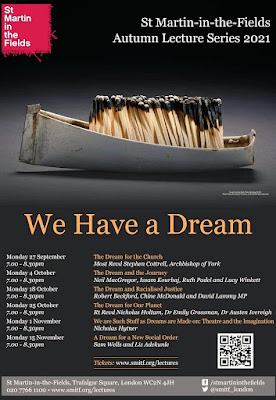“If it had not been the Lord who was on our side … then the flood would have swept us away, the torrent would have gone over us; then over us would have gone the raging waters” (Psalm 124). This is the Gospel in a nutshell.
To illustrate that statement, I want to share a story of one church in the pandemic. During the pandemic, I was at St Martin-in-the-Fields where, lockdown stopped our commercial activities overnight deleting two-thirds of the congregation’s income meaning that we had to shed three-quarters of our commercial and ministry staff. It was a devastating, depleting and distressing experience. Yet online, the congregation, its public ministry, and its music have found a reach, purpose, and dynamism like never before. All was made new. The musicians recorded music, weekly, for 4,000 churches across the land. HeartEdge seminars became a hub for innovation and evaluation. The Being With course drew participation from people far and wide, a good many of whom had been unable to attend services in a building before lockdown. Our national homeless charity had never been more in demand, or attracted more support, and worked fervidly to help people find secure accommodation.
Beautiful things happened – too many to recount - but it was also a complete nightmare, in which plans made and an institution crafted over generations were torn apart in ways a raging inferno couldn’t have achieved. And yet, like a ram in a thicket, something was always provided, or emerged, or suddenly changed. We were guided through the storm of these intense, distressing, but far from godless months, by some initial words from our Vicar, Sam Wells, who said:
“We come to church each Sunday, we pray and read our Bibles through the week, to prepare ourselves. Jesus grew up in Nazareth, travelled around Galilee to prepare himself for Jerusalem. In Jerusalem people discovered who he truly was, and what his words and actions really entailed. We’ve spent decades, many of us, preparing we knew not what for. Well, now we know. This is the moment when the world finds out whether being a Christian makes any difference or not.
In Britain, we say pray for a sunny day, but take an umbrella. I’m not saying in the face of the virus we don’t take sensible steps. We must follow public health advice. We do so not because others are a danger to us, but because we might, directly or indirectly, be a danger to them. We’re a community defined not by fear but by trust, not by scarcity but by plenty, not by anxiety but by communion. It’s time to show our true colours.
This is the moment to find ways to overcome isolation that don’t involve touch. We have this opportunity to explore the hinterland of the word with, that doesn’t always involve physical presence, but still means solidarity and kindness, generosity and love. We will limit our contact to protect the most vulnerable, but we still need to proclaim that there’s something more infectious than coronavirus – and that’s joy and peace, faithfulness and gentleness.
It was in its most bewildered hour that Israel in exile found who God truly was. This is our chance to discover what God being with us really means. None of us would for a moment have wished this crisis on anybody, let alone the whole world. But our faith teaches us that we only get to see resurrection through crucifixion; that we see God most clearly in our darkest hour.
Remember what Isaiah tells us. You shall cross the barren desert; but you shall not die of thirst. You shall wander far in safety – though you do not know the way. If you pass through raging waters in the sea, you shall not drown. If you walk amid the burning flames, you shall not be harmed. If you stand before the power of hell and death is at your side, know that I am with you through it all. Be not afraid, says our God. I am with you like never before.
This is our faith.”
In a sermon from that same time, Sam also said: “God doesn’t spare us from the fire. God doesn’t rescue us from the fire … God is with us in the fire. ‘Though I walk through the valley of the shadow of death, I fear no evil; for you are with me.’ ‘When you walk through fire you shall not be burned, and the flame shall not consume you.’ That’s the gospel …
Jesus isn’t spared the cross. Jesus isn’t rescued from the cross. Jesus is with God on the cross. The bonds of the Trinity are stretched to the limit; but not ultimately, broken. When we see the cross we see that God is with us, however, whatever, wherever … forever. This is our faith.”
As a result, we can say with the Psalmist: “If it had not been the Lord who was on our side … then the flood would have swept us away, the torrent would have gone over us; then over us would have gone the raging waters.” May we know that truth in whatever difficulty we face currently. Amen.












